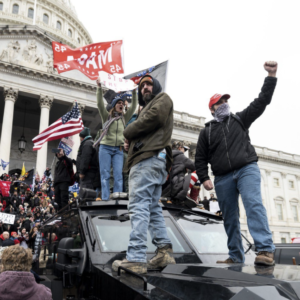The mob that breached the United States Capitol yesterday did unforgivable violence to one of our nation’s most hallowed spaces. But its unwelcome intrusion may have also roused our too-often-sleepwalking Congress to once again become the forum for great speeches, serious deliberation, and the working out of a possible way forward for this divided country.
The revival of a spark began at the outset of the day’s proceedings before the rabble arrived. After the two chambers split off from their joint session to deal with the objection to Arizona’s electoral votes, Senate Majority Leader Mitch McConnell (R-KY) gave the speech of his life. Shaking with emotion, he explained why Congress could not “declare ourselves a national board of elections on steroids” without putting American democracy into a “death spiral” in which every election is rejected. He thundered against the tendency to excuse one side’s bad behavior with reference to the acts of the other: “We must not imitate and escalate what we repudiate.”
Not long into the Arizona debate, both chambers were suddenly interrupted by the incursion of people who began the day being called “protestors” but lost the right to be described so benignly when they broke the windows of the Capitol and stormed in. The surreal, awful images that followed will be seared into our country’s collective memory forever: podiums carried out by grinning goons, a Confederate flag waving, smoke filling the marble halls, and hooligans running rampant, taking selfies as they mindlessly declared their vindication.
How and why the Capitol Police and other law enforcement officials failed to prevent this abomination are questions that will have to be answered later. Clearly, somewhere along the line, there were unforgivable failures of judgment.
But Congress remained resolute. Quick-thinking staffers grabbed the physical boxes containing Electoral College votes so that proceedings could continue without further delay. Members kept their composure as they were hurried off to safety, with many managing to conduct interviews broadcasting a single message: we are safe and undaunted and will finish our work tonight.
Indeed, late in the evening order was restored and both chambers resumed their deliberations. Some commentators wished our legislators would simply stop talking in the wake of such awful events. But doing so would have betrayed the spirit of the institution. Congress is all about letting people have their say, and hearing objections is also what the Electoral Count Act demanded. We will not get through difficult divisions by breaking off communication, but by continuing to argue. Seeing the process through was itself the night’s biggest victory.
But we also got some unforgettable oratorical moments, especially from Republicans denouncing their party’s role in bringing about the day’s events. Senator Mitt Romney (R-UT) delivered a scathing indictment of the “insurrection, incited by the President of the United States,” and earned an ovation for his insistence that “the best way we can show respect for the voters who are upset is by telling them the truth!” Rep. Tom Reed (R-NY), speaking on borrowed Democratic time, denounced “mob rule that spat upon the blood of my father that is in the soil of Europe and in the soil of Korea.” Rep. Adam Kinzinger (R-IL) condemned the way that “misinformation and fear has been fed into people for profit and power.”
Long after most of us had gone to bed, the deliberations went on, culminating in the affirmation of President-elect Joseph Biden’s Electoral College victory at 3:39 a.m.
The day was not without dark portents. The vast majority of House Republicans voted to object to the electoral votes from Arizona and Pennsylvania, a disappointing failure to rise to the occasion. Only seven Republican Senators joined in that charade.
One of the objectors, House Minority Leader Kevin McCarthy (R-CA), insisted, “This Congress will not be the same after today,” and encouraged members to think more carefully about what they post on social media. But such fine words will need to be matched by actions. “We solve the problems of our nation not through destruction, but through debate,” McCarthy intoned—but it remains to be seen if he and his colleagues will do everything in their power to ensure that those responsible for yesterday’s destruction are punished.
By giving members of both parties an unmistakable enemy to rally against—a literal invasion—the events of January 6, 2021 have the potential to galvanize Congress and renew its members’ dedication to the public good. Let us hope they continue to rise to the occasion.

